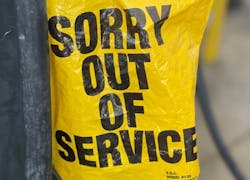Out of Service: Pipeline Shutdown Creates Headaches for Dealers
Tire dealers in the southeastern U.S. are grappling with the impact of the recent Colonial Pipeline shutdown.
The 5,500-mile-long conduit - which stretches from New Jersey to Texas and supplies the east coast of the U.S. with nearly 50% of that region's gasoline - was shut down by its owner, Colonial Pipeline Co., on May 7 due to a ransomware attack.
Gas is flowing through the 58-year-old pipeline again, but several tire dealers are still struggling with the impact of its shutdown.
“It had a couple residual effects,” says Ryan Benton, vice president of retail sales and operations at Whiteville, N.C.-based Black’s Tire Service Inc. “Because of the uncertainty, we pulled our outside sales force to work inside. The gas stations have been crazy. It's been like a zoo.
“There have been several days in different towns where there's no where to get gas. We've had service trucks that have had to run while they're working and they've run out of gas (and) we've had to park them.
“I've noticed that some retail traffic (in our stores) has slowed down because people are trying to conserve,” he reveals. “And it's an additional anxiety on the public -- one more thing to have our workforce and motoring public on edge.”
“Our (employees) who live farther away - some have run out of gas and couldn't get to and from work.” (Fortunately, there have only been a few of these instances, he adds.)
The fuel shortage has impacted Black’s Tire’s wholesale business, as well. “Most of those trucks are diesel, but getting them in and out of their fuel stops has taken more time."
And the pipeline shutdown has had a personal impact on Benton. “For me, it was an added stress, because I travel a good distance for work. I was planning out several days in advance. But I found a good gas station that had good traffic control.”
Virginia Tire & Auto LLC, a 17-location dealership based in Fairfax, Va., also operates three gas stations. The shutdown "has certainly posed issues,” says Julie Holmes, the company’s co-CEO.
“We keep running out of gas. But as far as the tire stores, the only issue is that some of our deliveries of tires are being curtailed, so instead of getting multiple deliveries in one day, we are just getting one delivery.
"We were told that it will take five days after the pipeline is back in order to resume normal deliveries,” she says.
“We are thinking that by the end of the weekend, things should be pretty normal. We are getting deliveries, but they are just partial deliveries of gas and very sporadic and as soon as we get it, we run out."
Craig Dobrin, vice president of operations for Butler Tires & Wheels, which has four outlets in the greater Atlanta, Ga., area, says that “what you’re seeing on the news is not much of an exaggeration. There was literally no traffic yesterday, as I’m sure there were 50% fewer cars on the road than normal.”
Many gas stations in Dobrin's area have covered pump handles with yellow “out of order” bags, he adds.
“We have had several customers who waited two to three hours for five to 10 gallons, depending on the station, and some of the stations are gouging to the tune of $5 to $6 a gallon.
Dobrin has been personally impacted, as well. “On Tuesday, I resorted to using my last 15 gallons of 100-octane fuel that I use in my fun car, so that was a $225 fill-up that will maybe go 150 miles, if I'm lucky.”
Another Atlanta-area tire dealer, Jim Baxter, owner of Neighborhood Tire Pros & Auto Service, which has four locations, says his company “has trucks on the road, so we’ve had to manage our own fuel supply to maintain our business.
“The first couple of days, you just couldn’t find fuel anywhere. Atlanta is a commuter city. Most people live 30 to 40 minutes away from where they actually work. I think there was a mad rush on fuel” immediately after the pipeline shut down.
“People filled up their vehicles when they heard about it and then everyone was out of gas. I started to see fuel (at gas stations) again around 3 p.m. yesterday. But the first couple of days, you couldn’t find fuel anywhere.
“I think if the (shortage) had lasted through the weekend, you would have seen panic set in” among drivers, he says.
“People would not have been able to drive to their jobs or (engage in) their normal patterns of travel. I don’t think we crossed the line where people were impacted to the point where they couldn’t go where they needed to go. But a few days more and it would have been chaos, I think.
“It makes me nervous - how vulnerable we are. If we were out of (gas) for seven-plus days, we’d be in trouble. There’s no alternate plan if there is an issue. It just adds to all the chaos.
“Ever since February of last year, it’s been” one thing after another, he says. “Between COVID-19 and everything else that’s been going on in the world, everyone is just numb to things.”
